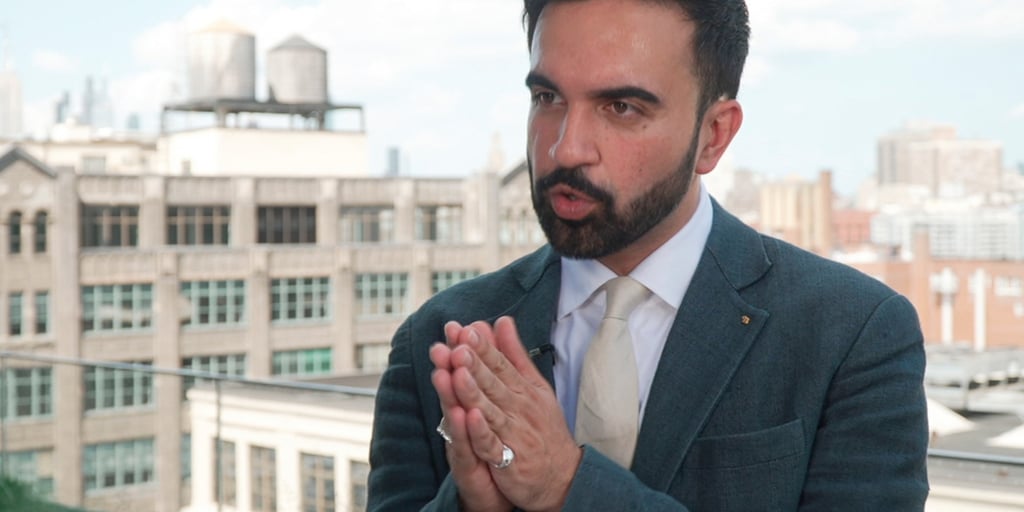The American Experiment, Remembered and Forgotten
Analysis of NYC's new mayor Zohran Mamdani
ELECTIONS
Daniel Donnelly
11/13/20257 min read


One week ago, Zohran Mamdani was elected Mayor of New York City, the largest city in the United States. Not only did he win, but in a seven-horse race, he won by 50.39%, which is twenty points higher than most pundits had expected. Turns out that when you have a solid organization promoting your candidacy and your candidacy offers actual solutions instead of vapid talking points, the electorate responds favorably… even if the solutions may do more harm in the long run.
Mamdani’s candidacy and victory have given rise to rhetoric which we do not often see in modern America, at least not so openly. Mamdani, aged 34, was born in Uganda to transplanted Indian parents and is Muslim. Thus, when he won the Democratic primary in June 24th, 2025, national pundit Dinesh D’Souza thought nothing of suggesting on X that Mamdani’s victory would lead to a repeat of 9/11 in NYC. D’Souza was joined in the comparison by President Donald Trump’s son, Don Jr, who re-tweeted someone who had written that there was a time “when New Yorkers endured 9/11 instead of voting for it.” Even Charlie Kirk – whom many people have rushed to canonize after his murder this September – tweeted immediately after the primary, “24 years ago a group of Muslims killed 2,753 people on 9/11 Now a Muslim Socialist is on pace to run New York City.”
If these were high profile persons’ unguarded utterances resulting from shock over the Democratic primary’s outcome, it had not abated four months later. On October 21st, Larry Elder posted on X a cartoon of an airplane crashing into the World Trade Center. At least Elder was slicker about his jibe than his Republican colleagues had been months earlier. On the airplane he added the word “socialist” in subterfuge for what he was really expressing.
Stated plainly, it is the premise that being Muslim predisposes someone to terrorism or sympathy therefor, or otherwise makes someone unfit for public office. Some would characterize such a premise as “hateful,” but that is not why it is inadvisable. Free speech exists specifically to protect unpopular expressions or those which some would consider hateful. The premise that being Muslim or faithful to any or no religion makes someone unfit for public office is inadvisable because it contravenes the American Experiment.
The American Experiment Remembered
As a refresher, the Mayflower arrived at Plymouth, Massachusetts in 1620 after two months at sea. Of the 104 passengers, fifty-one were members of a Protestant sect called Separatists, who had fled England then the Netherlands in search of religious liberty. History has come to call them the Pilgrims. The remaining fifty-three passengers were secular adventurers seeking to establish a mercantile outpost. The expedition had been chartered for settlement in northern Virginia, but storms prevented the Mayflower from navigating southwards along the Atlantic Coast. As the expedition lacked explicit authorization for settlement in this region, the two groups drafted and signed the Mayflower Compact. By way of this compact, the two groups agreed to cooperate despite their religious differences in the creation and operation of a government for the new colony.
Colonization in other parts of North America played out differently than in New England, but cooperation despite religious differences would be a unifying theme of the American Experiment. Catholics founded the colony of Maryland in 1634 to escape persecution in England. Quakers founded Pennsylvania in 1682, as their religious rejection of man-made hierarchies had made them very unpopular in classist England. Cash croppers founded Virginia (Jamestown in 1607) and the Carolinas (1670, though partitioned in 1712) for cultivating tobacco, cotton and rice on sprawling plantations, leaving much of the labor to enslaved Africans. Philanthropists founded Georgia in 1733 to rehabilitate the poor by inculcating industriousness through agricultural labor. Soldiers founded New York after muscling it from the Dutch in 1664, with life on the patroons (plantations with adjunct artisanal workshops) undisturbed but for taxes going to the new (British) government.
Within this unique patchwork of societies and economies the American identity was forged. Just as the Mayflower’s passengers had compacted to cooperate despite religious difference or indifference, cooperation became widespread throughout North America’s colonies, as evinced by extensive internal trade networks. By the time of the American Revolution, this cooperation proved indispensable for survival. When the United States were called to form a sovereign national government, our founders enshrined this principle in the Constitution at Article VI, Clause 3, “No religious Test shall ever be required as a Qualification to any Office or public Trust under the United States.”
Despite the religious tolerance expressed in our Constitution and the Mayflower Compact, it must be acknowledged that Americans have not always lived up to this lofty ideal. Mormonism was founded in upstate New York but soon found its devotees chased westwards across North America on the heels of lynchings. Jehovah’s Witnesses were denounced as unpatriotic during World War Two because their religion prohibited their public pledge of allegiance to any entity besides G-d, a right which the U.S. Supreme Court upheld 6-3 on First Amendment grounds in West Virginia State Board of Education v. Barnette, 319 U.S. 624 (1943).
In terms of religious discrimination for political office, the presidential election of 1928 came down to Herbert Hoover, a Republican and Protestant, against Alfred Smith, New York’s Democratic Governor and an avowed Catholic. Though the Bible Belt – traditionally inimical to “Papists” – stuck with Smith along partisan lines, historians believe that Smith’s religion proved a liability for much of the national electorate, such that he lost the popular vote by 17% (6.4 million) and the electoral college by 357 votes.
The spectre of religious intolerance was also raised during the presidential election in 1960, again between a Protestant and Catholic in the respective persons of Richard Nixon, U.S. Vice President, and John F. Kennedy, Democrat and U.S. Senator from Massachusetts. On September 12th, 1960, Senator Kennedy addressed the matter before the Greater Houston Ministerial Association. He said that if the electorate rejected him in fair judgment of his policies, then he would graciously accept the loss, but if “forty million Americans lost the chance at being President on the day they were baptized, then it is the whole nation which will be the loser.” (time stamp 09:00)
The American Experiment is therefore about anyone being eligible to contribute to society and government, regardless of birth, color or creed. In this way we theoretically maximize the range of perspectives available to those who direct and operate government. Zohran Mamdani’s faith of Islam, hence, is in itself no bar on his qualification for New York City’s mayoralty. Furthermore, though anyone has as he should every right to suggest that Mamdani or any Muslim is predisposed to terrorism by his faith alone, it is an irresponsible position to espouse given that it blinds the person to the reality that terrorism can be perpetrated by members of any religion.
The American Experiment Forgotten
Having addressed the distasteful rhetoric prejudging Mamdani by his religion, we arrive at legitimate examination of his ideology and policies, and here we have good reason for concern. The American Experiment of cooperation despite core differences also made possible a nationwide flourishing in commerce, which over time raised everyone’s living standards. New York City was emblematic of much of that progress, and now Mamdani views its government as capable of building prosperity when in truth all government can ever do is seize prosperity from those who produce it for redistribution to those who do not.
Affordability was Mamdani’s main issue, and he proposed several solutions to address it in the contexts of housing, childcare and grocery shopping. For example, he recognizes disparity in relative tax burdens between affluent neighborhoods and “up and coming” communities, so he wants those affluent neighbors taxed more instead of simply reducing taxes on the struggling neighbors. For childcare, he wants NYC to subsidize it so that New Yorkers who decide to have no kids are forced to pay for those who do. For grocery shopping, Mamdani recognizes that several private supermarkets accept millions of dollars in municipal subsidies to operate in areas for the prevention of “food deserts,” only to raise their prices such that New Yorkers afford fewer groceries. His solution is for NYC to own and operate its own competing supermarkets instead of discontinuing the private supermarkets’ subsidies which would induce them to be more competitive with their pricing.
Currently numerous articles declare that big businesses and wealthy New Yorkers are fleeing NYC, but that may be hyperbole which is typical in the wake of elections. It remains to be seen whether such relocations occur in fact. Of course, if NYC’s tax base is depleted by such relocations, Upstate will be taxed to recoup Downstate’s shortfalls.
No One Notices Fish Drowning beneath the Waves
The article in September averred that Mamdani should be judged against his opponents, and by that standard, he outshined the opposition. His campaign offered thoroughly researched policies on multiple issues whereas the opposition offered hollow talking points about resisting President Trump and some fuzziness about affordability. Mamdani self-identifies as socialist, but absolutely no one regards his closest rival Andrew Cuomo as a paragon of free market capitalism! Cuomo is as cronyist as they come, such that New York State still suffers the consequences of Cuomo’s many appointments as to regional economic development councils.
Judged against previous mayors of recent memory, Mamdani may not be as catastrophic as outlets like the New York Post proclaim. Bill de Blasio and Michael Bloomberg were also notorious in their disdain for free enterprise, so NYC will probably survive another mayor who misunderstands economics. Survive, yes, but not thrive… for those days are long gone.
The sad fact is that New York City has been living for a while on borrowed time. Much of the financial industry has fled the plantation for more appreciative locations. Likewise manufacturing, tech, IP work, meatpacking, etcetera. NYC used to have cultural clout from the movies filmed in or about NYC like Ghostbusters, Short Circuit 2 (1988) and On the Town (1949), but NYC taxed the production of all film and most television over to friendlier locales. It used to be that you’d move to NYC to “become someone.” Now everybody’s moving out of NYC to become someone in cities like Austin, Miami or Charlotte. All this leads to the conclusion that if Mamdani proves disastrous to whatever’s left of NYC, no one will really notice, much less care.
